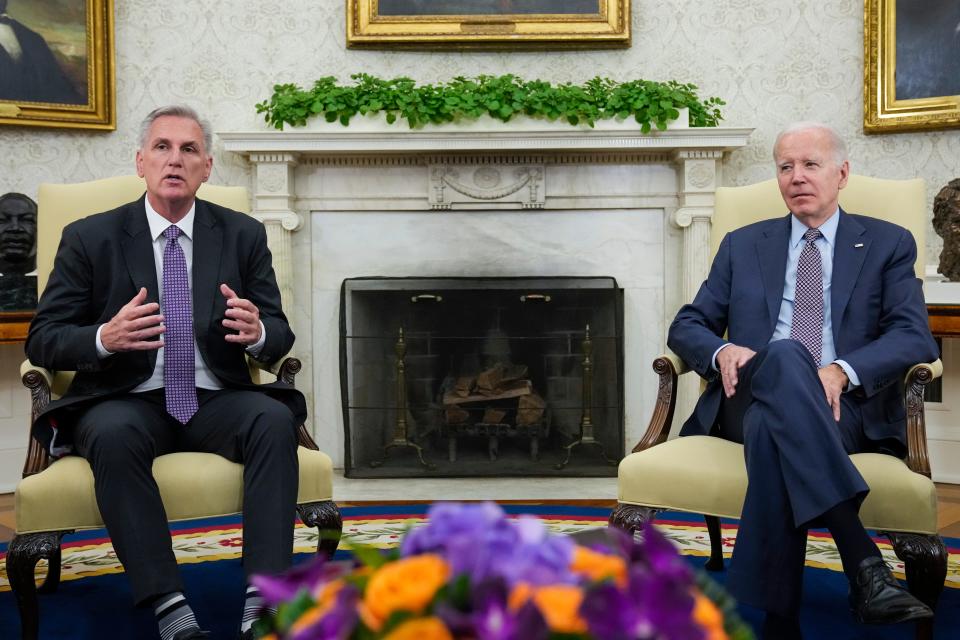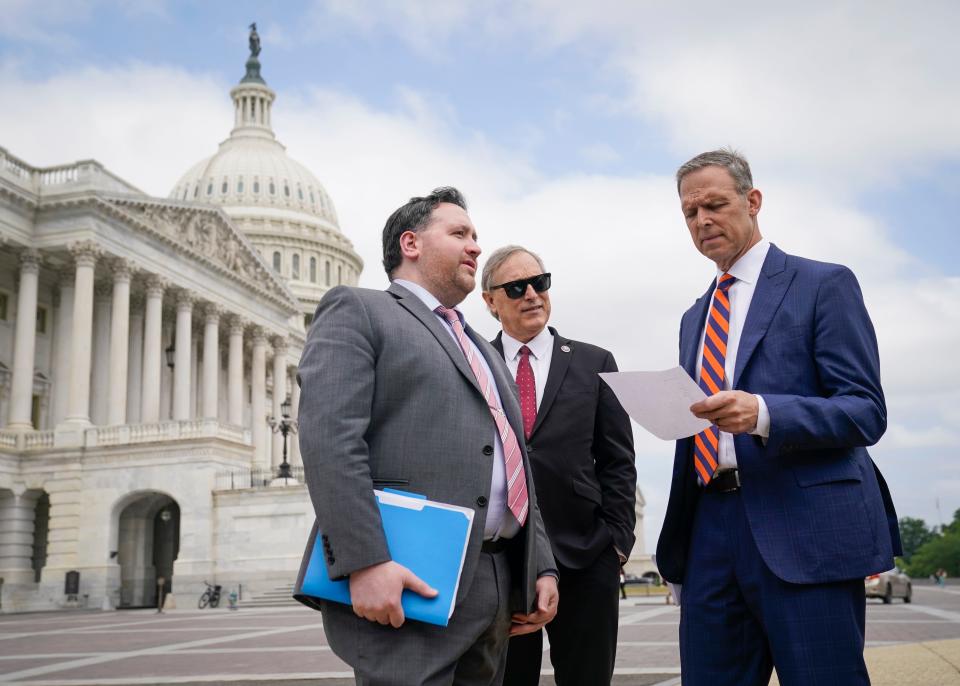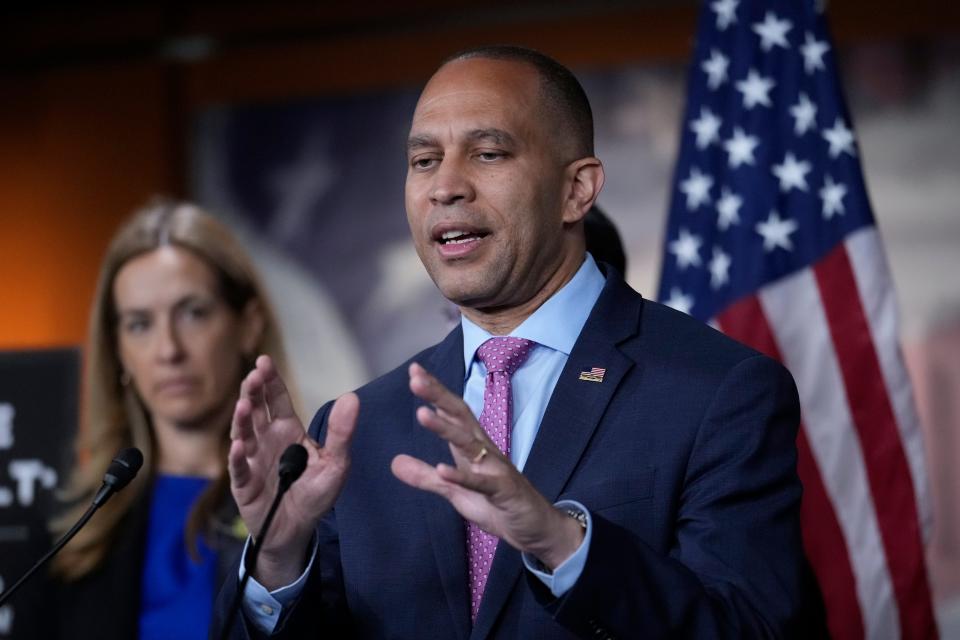GOP hardliners are furious, Democrats play coy: What to know ahead of the House debt ceiling vote
- Oops!Something went wrong.Please try again later.
- Oops!Something went wrong.Please try again later.
Republican Kevin McCarthy’s razor-thin speakership faces its biggest test since he grabbed the gavel in January as his debt deal with President Joe Biden comes up for a vote Wednesday.
McCarthy and the president came to an agreement during an hour-and-a-half phone call just days before the United States ran out of money to pay its bills.
The plan raises how much the government can borrow until 2025, which was Biden's top priority during talks with Republican leaders. It also freezes annual discretionary, non-defense spending for two years while delivering $2.1 trillion in other domestic spending cuts GOP lawmakers wanted.
"Republicans are changing the culture and trajectory of Washington—and we’re just getting started," the speaker said in a Memorial Day tweet.
- Historic $2.1 Trillion spending cut
- 72 hours to read the bill
- Only 99 pages
Republicans are changing the culture and trajectory of Washington—and we’re just getting started.— Kevin McCarthy (@SpeakerMcCarthy) May 30, 2023
But not so fast, Mr. Speaker.
Any victory lap is contingent upon getting the Biden-McCarthy deal through a thorny Republican caucus filled with conservative lawmakers who have fealty to slashing government spending.
And there's no guarantee progressive Democrats, who held a conference call Monday to discuss the plan, will back up Biden either. Liberals are likely to raise objections to parts of the deal such as expanding work requirements for some aid programs, keeping the Trump-era tax cuts and speeding up a natural gas pipeline project in Appalachia.
Here are three things to know ahead of Wednesday's debt ceiling vote in the House.
Biden, GOP leaders like the deal
The president was all smiles and good vibes coming out of his phone call with McCarthy, and he exuded optimism Monday when asked if lawmakers would adopt the agreement.
“I feel very good about it,” Biden told reporters outside the White House on Monday. "I spoke to a whole bunch of people, and it feels good"
Biden would like nothing more than to end what's been a headache of negotiations that has brought the nation to the brink of default and economic disaster. If the deal passes, this means he won't have to deal with the debt headache until after the 2024 presidential campaign.

But importantly, Biden will likely brag about saving domestic programs − from rental aid and scientific research − from House Republicans who wanted to make deeper cuts.
Besides keeping the same funding levels for the federal budget, the deal also spares Social Security and Medicare, which was a sticking point for the president during his State of the Union address earlier this year.
Senate Minority Leader Mitch McConnell, R-Ky., rushed to defend the Biden-McCarthy plan within hours of its announcement in the hopes of giving the speaker cover. McConnell said it "makes urgent progress toward preserving our nation’s full faith and credit and a much-needed step toward getting its financial house in order."
Conservative victories − but GOP House hardliners are furious
McCarthy's allies in the House are telling reporters the deal will "absolutely pass" because it holds so many Republican victories.
Among the most obvious is that the deal claws back billions in unspent COVID-19 relief funding, yanks $10 billion in IRS funding and limits how long able-bodied adults 54 years old or younger without dependent children can receive food stamps if they do not meet certain work requirements.

"The deal on the debt limit is full of conservative wins," South Dakota Republican Rep. Dusty Johnson, who leads the Main Street Caucus, tweeted.
Many GOP members are likely to echo Johnson, who argues that, by forcing Democrats to find money in the existing budget, most conservatives will support the plan.
Yet some fiscal hawks expressed their dismay publicly and have described McCarthy as a traitor to their cause.
"After I heard about the debt ceiling deal, I was a no," Florida Rep. Byron Donalds, a Republican who challenged McCarthy for the speaker's gavel, said in a May 29 tweet. "After reading the debt ceiling deal, I am absolutely no!!"
After I heard about the debt ceiling deal, I was a NO.
After reading the debt ceiling deal, I am absolutely NO!!— Byron Donalds (@ByronDonalds) May 29, 2023
Colorado Rep. Ken Buck, a Republican who was one of the key votes needed for McCarthy to win the speakership, said the deal gives Biden and the Democrats a "free pass on defending their reckless spending" ahead of the 2024 campaign.
"This deal must be rejected," he said.
On Tuesday, members of the House Freedom Caucus assembled outside Capitol Hill to denounce the plan, saying McCarthy failed.
But other conservative members who are equally known for their unwavering views expressed support for McCarthy's agreement with the president.
Kentucky Rep. Thomas Massie, a fierce GOP fiscal hawk, praised it for including parts of his so-called "penny plan" that requires a cut to 1% of spending across the board if Congress doesn’t pass appropriations bills.
"I respect opposition to the Fiscal Responsibility Act, but I am voting yes," Massie said in a tweet late Tuesday evening. "I’ve been in Congress for a decade and this is the first real bill that cuts spending. "
I respect opposition to the Fiscal Responsibility Act, but I am voting yes.
I’ve been in Congress for a decade and this is the first real bill that cuts spending.
It also includes an automatic 1% cut to spending on January 1 if Congress doesn’t pass the 12 appropriations bills.— Thomas Massie (@RepThomasMassie) May 31, 2023
Congressional Democrats are playing coy, for now
With the spotlight on McCarthy and his caucus, the Biden administration is quietly calling House Democrats to win their votes.

There's little for House Democrats to celebrate in this proposal, but the charm offensive appears to be working in the sense that it has kept progressive lawmakers from speaking against the deal at the same volume as their right-wing colleagues.
Democratic Rep. Ro Khanna, of California, said liberal-leaning members are "in flux" about whether they will support the plan. But leading up to Wednesday's vote he took a swipe at the deal.
"The debt deal is cutting food stamps (and) social programs while we have an affordability crisis," Khanna, a member of the Congressional Progressive Caucus, tweeted Tuesday.
The congressman's message linked to a 2022 survey by the Federal Reserve, which found about 37% of Americans said they don't have enough money to cover a $400 emergency.
"It is not 'extreme' to speak up for low income Americans," he said.
Explain this: A record high 37% of Americans lack $400 for an emergency payment. The debt deal is cutting food stamps & social programs while we have an affordability crisis. It is not “extreme” to speak up for low income Americans. https://t.co/t9X1VQ89iL
— Ro Khanna (@RoKhanna) May 30, 2023
Other Democrats such as Rep. Cori Bush of Missouri said, as someone who once received food stamps, she is leaning against the deal, describing the work requirement as "racist, classist and inhumane."
Limiting Democratic unrest will be critical for the White House given the growing number of House Republicans slamming the McCarthy-Biden deal, which might have to use Democrats as a crutch to save the bill.
This article originally appeared on USA TODAY: Biden, McCarthy deal: What to know about the House debt ceiling vote

